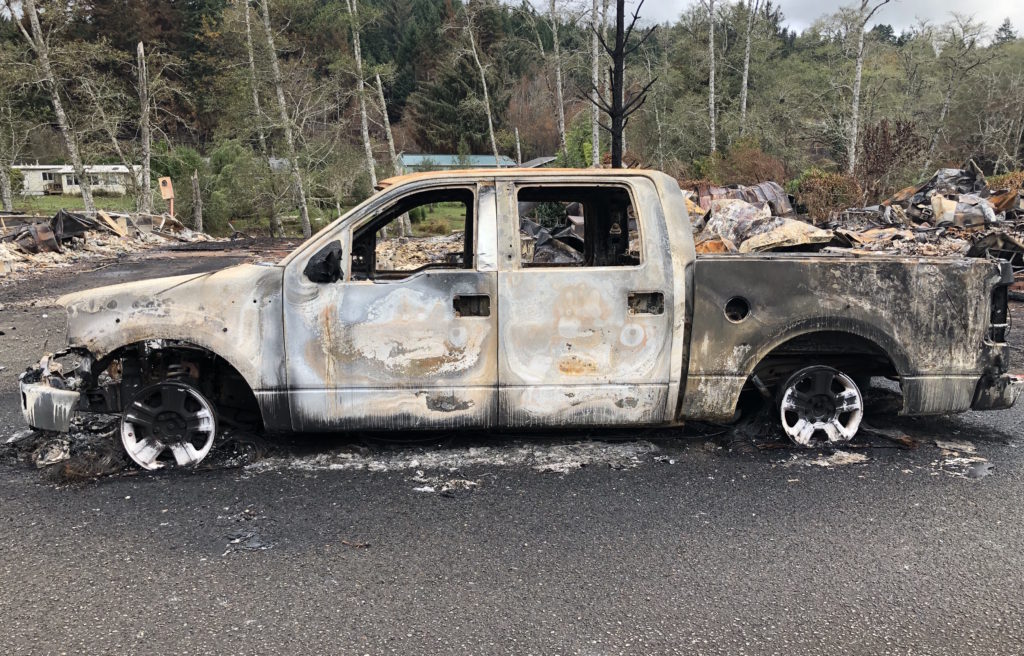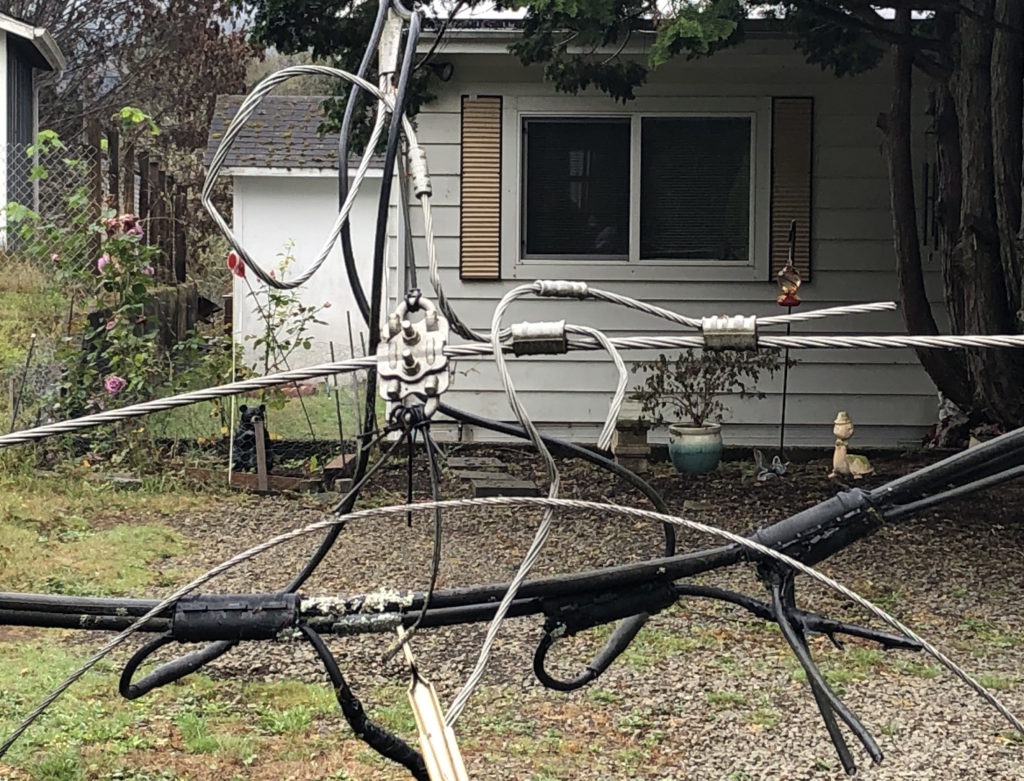
By QUINTON SMITH/YachatsNews.com
Fires are still smoldering in Otis.
Evacuees are still in shelters, motels or living with friends and families.
Power and water are only slowly returning to 2,500 acres and more than 100 homes incinerated last week by the Echo Mountain and Kimberling fires in north Lincoln County.
But Lincoln County fire and emergency officials want the 22,000 households stretching from Rose Lodge to Yachats to pause and use this unfortunate but teachable moment to begin preparing for the next disaster. There will be one.

“Always after an event like this, people are more likely to pay attention to their disaster planning,” said Frankie Petrick, longtime administrator of the Yachats Rural Fire Protection District. “People get complacent … and then something like this happens.”
When the fires roared down the Salmon River canyon late last Tuesday and early Wednesday, some people escaped with only the clothes on their back. Sheriff’s deputies, firefighters and volunteers went door-to-door in many places to alert residents of the inferno racing through tinder-dry forests pushed by unusual 50 mph east winds.
Electricity went out from Rose Lodge into north Lincoln City, where large stretches of the community – including its hospital, a nursing home and businesses – were forced to evacuate. With that, down went many communication systems.
Many residents were unaware of the looming disaster or what to do.
Local fire and police agencies are the first to respond to natural disasters. Those agencies have interconnected mutual aid agreements to allow them to call on others when calamities tax their capabilities.
Then come state and federal resources – like the Oregon Department of Forestry, Siuslaw National Forest and last week even the Oregon National Guard — to help.
Community organizations like the American Red Cross, churches, school districts and civic groups also step in to help people during and after the disaster. And, of course, individuals everywhere seem to pitch in to donate and help.
But emergency officials say few things are better than residents who take precautions to protect their property and then to develop a disaster plan.
“People need to take the time to explore the worst-case scenario for their family and then plan for it,” says Casey Miller, the longtime information officer for Lincoln County.

Getting people to prepare is hard
Lincoln County has an active emergency management agency that has spent years preparing plans and engaging agencies on how to react to disasters. It has also developed resources that communities and individuals can use to help themselves.
But getting people to act is always a challenge.
“It’s been a very tough nut for us to crack,” said Bob Bennett, who has spent years on a city of Yachats emergency preparedness committee and serves as the city’s liaison with the Yachats fire district. “It can be hard to get people to pay attention.”
It may be as simple as being able to weather a bad winter storm that knocks out electricity to your home for 1-2 days.
Or what to do when a downed power line sparks a grass fire that races up a forested hill where dozens of other houses line twisting, one-lane roads.
Or, that really big one – the Cascade subduction zone tsunami — predicted to someday inundate the Oregon coast.
“You have to have the worse-case scenario in your plans … and then be able to shift and pivot,” Miller said.

Oregon faces seven major natural hazards
The Oregon Office of Emergency Management told The Oregonian newspaper this week that there are seven major hazards Oregonians should prepare for: wildfires, earthquakes, tsunamis, volcanoes, floods, winter storms and extreme heat.

To prepare, people should stay informed about upcoming disasters, build emergency kits to store at home and in vehicles, make an emergency plan and be prepared to be self-sufficient for up to at least two weeks, the agency says.
There are plenty of pre-made kits that families and individuals can buy, but Andrew Phelps, director of the Oregon Office of Emergency Management, told The Oregonian that it’s important to customize emergency supplies for your own household’s needs.
“Preparing for a disaster is really very personal and needs to be individualized for you and your family, no matter what that looks like,” Phelps said. “As our circumstances change – if we start taking a different medication, if you add family members, if you add pets – your disaster preparedness needs to change.”
People also need to adapt their emergency supplies to the evolving threat of disasters in the Pacific Northwest.
Oregon’s intense wildfires this summer have sent people scrambling to buy air purifiers and high-grade air filters for their homes. The coronavirus pandemic has made face coverings mandatory items to have on hand. And as society becomes more reliant on smart phone technology, keeping external battery packs charged and on hand is necessary for any prolonged power outages.
“In a personal plan it’s about redundancy,” said Lincoln County’s Miller. “Hey, I have a cell phone but do I have a radio – and does it have batteries?”
County has active emergency management agency
Lincoln County’s emergency services department is run by the sheriff’s office, and has a vast list of resources and information available on its website, including fire and disaster recovery information.
There is an extensive presentation on protecting property from wildfires, tsunami risk and preparedness, and how to sign up for the county’s emergency alert system.

It was that alert system that was in heavy use last week – and gained an additional 3,000 users during the evacuations. It now has 14,000 people signed up.
“These events bring it into peoples’ awareness that there’s this tool to help,” Miller said.
But Miller reminds people that “no technology is immune to the worse-case scenario.”
“People are so used to being connected,” he said. “And remember, if the infrastructure goes down, government is handicapped as well.”
Of course, no official emergency plan is perfect in the face of large wildfires or tsunamis. That’s why county officials and first responders will conduct a public analysis of their response to the Echo Mountain fires, including how the advent of social media fueled expectations and communication.
But that’s also where personal preparation comes in, Lincoln County Sheriff Curtis Landers told YachatsNews.
“This fire could have occurred anywhere in the county,” he said. “A disaster can happen anywhere and you don’t know what it’s going to be.”
Taking personal responsibility
“We need to take a level of responsibility for ourselves and our families,” Phelps told The Oregonian. “Disasters don’t wait for you to be prepared, I think a lot of folks have been seeing that over the last week.”
While many Oregonians may already have some kind of emergency kit at home, it’s a good time to either refresh your supplies or add to what you have. While the Oregon Office of Emergency Management encourages people to customize kits for their own needs, the agency points to a list of basics put together by the American Red Cross:
- Water: one gallon per person, per day. Have a three-day supply for evacuation and a two-week supply for home.
- Food: nonperishable food that is easy to prepare. Again, have a three-day supply for evacuation and a two-week supply for home.
- Flashlight
- Battery-powered or hand-crank radio
- Extra batteries
- First aid kit. Get bigger kits for larger households, and regularly refresh expired items
- Medications and medical items. Keep at least a seven-day supply on hand
- Multi-purpose tool, like a Leatherman or Swiss Army knife
- Sanitation and personal hygiene items
- Copies of personal documents: medical information, proof of address, house documents, passport, birth certificate, insurance information
- Cell phone with charger or external battery back
- Family and emergency contact information
- Extra cash
- Emergency blanket
- Maps of the area
“A lot of people in Lincoln City got out the door with only the things they could carry,” Petrick said. “After an event like this it’s a good time to stop and take a look to see if you are prepared.”


